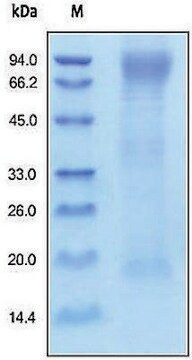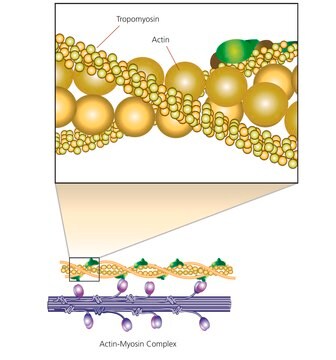추천 제품
생물학적 소스
human
재조합
expressed in CHO cells
분석
≥98% (SDS-PAGE)
양식
lyophilized
분자량
monomer 48 kDa by calculation
포장
pkg of 100 μg
저장 조건
avoid repeated freeze/thaw cycles
불순물
<0.06 EU/μg endotoxin, tested
색상
white
UniProt 수납 번호
배송 상태
wet ice
저장 온도
−20°C
유전자 정보
human ... HAVCR2(84868)
일반 설명
The TIM (T cell/transmembrane, immunoglobulin and mucin) family plays a critical role in regulating immune responses, including allergy, asthma, transplant tolerance, autoimmunity and the response to viral infections. The unique structure of TIM immunoglobulin variable region domains allows highly specific recognition of phosphatidylserine (PtdSer), exposed on the surface of apoptotic cells. Tim-3, a type I transmembrane protein, contains an immunoglobulin and a mucin-like domain in its extracellular portion and a tyrosine phosphorylation motif in its cytoplasmic portion. TIM-3 is preferentially expressed on Th1 and Tc1 cells, and generates an inhibitory signal resulting in apoptosis of Th1 and Tc1 cells. TIM-3 is also expressed on some dendritic cells and can mediate phagocytosis of apoptotic cells and cross-presentation of antigen. Tim-3 functions to inhibit aggressive Th1-mediated auto- and alloimmune responses. Tim-3 pathway blockade by administration of Tim-3:Fc fusion protein accelerates diabetes in nonobese diabetic mice, causes hyperproliferation of Th1 cells and Th1 cytokine release in an experimental autoimmune encephalomyelitis (EAE) model and prevents acquisition of transplantation tolerance induced by costimulation blockade.
물리적 형태
Lyophilized from 0.2 μm-filtered solution in PBS.
재구성
Reconstitute at 100 μg/mL in sterile PBS.
기타 정보
The extracellular domain of human Tim-3 (aa 22-200) is fused to the N-terminus of the Fc region of human IgG1.
Storage Class Code
10 - Combustible liquids
WGK
WGK 2
Flash Point (°F)
Not applicable
Flash Point (°C)
Not applicable
가장 최신 버전 중 하나를 선택하세요:
자사의 과학자팀은 생명 과학, 재료 과학, 화학 합성, 크로마토그래피, 분석 및 기타 많은 영역을 포함한 모든 과학 분야에 경험이 있습니다..
고객지원팀으로 연락바랍니다.





